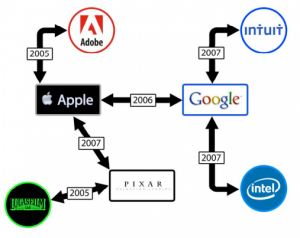Amid Talent War Apple, Google, Adobe Sued For Conspiring To “Fix” Employee Salaries
Last year, after an investigation, the US Department of Justice (DOJ) concluded that a number of tech companies, including Apple and Google, violated antitrust laws when they agreed not to poach and cold call each others’ employees. The DOJ obtained a settlement that “prevents [the companies] from entering into no solicitation agreements for employees” for […]

The DOJ settlement didn’t offer any compensation to the “victims” of the companies’ activities: the employees. Now, as you might imagine, there’s a class-action lawsuit on behalf of employees of the defendant companies. (Plaintiffs counsel see some relatively easy money here.)
The Lawsuit and the Conspiracy
The named plaintiff is Siddharth Hariharan, an engineer for Lucas Film between 2007 and 2008. Lucas Film is one of the seven companies named as defendants in the complaint. The other defendants are Adobe, Apple, Google, Intuit, Intel and Pixar.
The complaint alleges that executives from Lucas Film and Pixar (and later the other named companies) conspired to fix employee compensation at “artificially low levels”:
[Defendants] entered into at least three agreements to eliminate competition between them for skilled labor. First, each agreed no to cold call each others’ employees. Second, each agreed to notify the other company when making an offer to an employee of the other company, if that employee applied for a job notwithstanding the absence of cold calling. Third, each agreed that if either made an offer to such an employee of the other company neither company would counter offer above the initial offer. This third agreement was created with the intent and effect of eliminating “bidding wars”
Bidding War Costing Google Millions
The bidding wars referred to in the paragraph above have been well documented of late (especially between Facebook, Twitter and Google). TechCrunch previously reported, based on informed speculation, that two Google employees, Sundar Pichai and Neal Mohan, were each offered many millions of dollars in stock options and other compensation to keep them from defecting to Twitter.
It’s easy to see why companies would want to suppress this kind “bidding war.” However the conspiracy alleged in the complaint and found by the DOJ is clearly wrong and illegal. Indeed, assuming certain procedural hurdles are overcome, liability against most if not all the involved companies may be relatively easy to establish.
The Damages Challenge
The challenge will be figuring out damages. Who would have been recruited and how much they might have been offered or counter-offered in the absence of these agreements is completely speculative. Assuming the plaintiffs can prove their case the court would need to a) figure out who’s entitled to compensation (beyond the lawyers) and b) determine how to compensate class members when what they might have earned is almost impossible to determine.
Image from Forbes. Used with permission.
Opinions expressed in this article are those of the guest author and not necessarily Search Engine Land. Staff authors are listed here.
Related stories
New on Search Engine Land